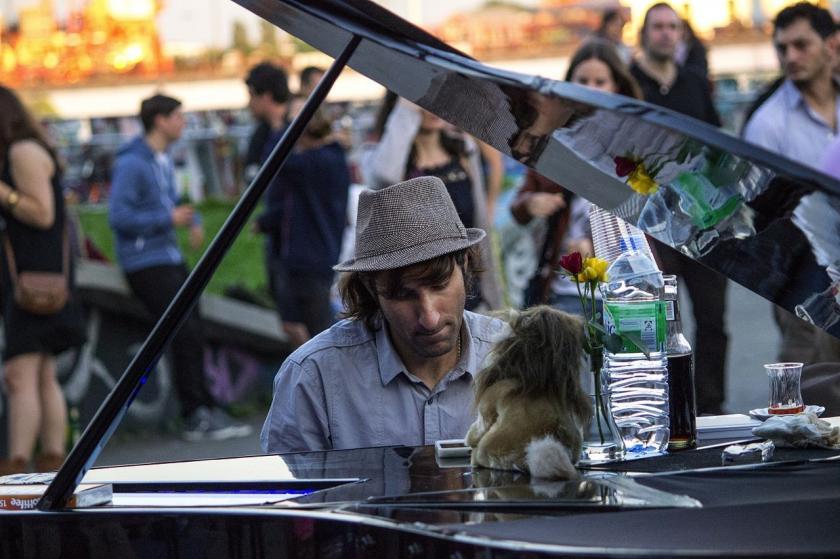Won't they hand over the country?

Hakkı Özdal

Fotoğraf: Murat Kula/AA
In his speech in Ankara on 1 May, President Erdoğan said, "There will be a president in this country with the support of Qandil. My nation will not hand over this country to a person who becomes president with the support he receives from Qandil". Naturally, these words were perceived as the culmination of the statements made by the government spokespersons for some time, which, with explicit or implicit hints, tried to see/show the 14 May elections on an axis of political violence. On 28 April, Interior Minister Soylu said, "15 July was a de facto coup attempt. 14 May 2023 is a political coup attempt that could bring together all of the preparations to liquidate Turkey...", while former prime minister and AKP Deputy Chair Binali Yıldırım said on 26 April, "This election is an election of the struggle for independence against the invaders".
These three statements in five days fuelled the concern, which can be summarised as "he will not leave even if he loses", that has been effective in some opposition circles for a long time. Were these assertive statements, in which the triad of 'terror', 'coup' and 'survival' were placed with majesty, an intimidation? Are Erdoğan and his close circle motivating a possible position regarding the election results?
The electoral atmosphere, which has been squeezed into polls and sometimes even street interviews, and which has ultimately created a clear area of uncertainty, reinforces these concerns. On top of this, the news of 'tension' coming from many cities one after the other in recent days has been added: The knife attack on the Green Left Party stand in Edirne, the attack by nationalists on Kılıçdaroğlu volunteers in Mersin, the provocative attempts against those returning from the CHP rally in front of the AKP election office in Manisa, the harassment of Presidental Candidate Kemal Kılıçdaroğlu in Adıyaman...
The question is widening: Will the government resort to the de facto usurpation of the elections by using all official and unofficial means and all state facilities at its disposal?
It is well known that Erdoğan-AKP, especially with their alliance consolidated after 15 July, has achieved an unprecedented political dominance over the state. This knowledge feeds the debate on whether the 'state' will choose not to recognise Kılıçdaroğlu's presidency. As the general channel of the election is compressed into details that are far from the political sphere, such as alliances, ballot line-up, who will vote for whom, these concerns/questions are added to the general atmosphere of uncertainty and push the society into a passive position, 'waiting by trying to predict what will happen to them'.
In this respect, it becomes more important to consider the state as an executive and protective focus of capital's projects regarding the direction of capitalism in Turkey, and as an instrument of repression of the ruling classes, rather than a momentary appearance of the state. The Marxist analysis of the state is a sign of the potential political power of labour against the uncertainty and passivity of anxious (or optimistic) liberals and 'democrats'.
Perhaps the question should be rephrased slightly as follows: Are the power relations between the Turkish state and the classes in relations of representation, patronage and tension with it of such a nature that they will not recognise a possible outcome 10 days later? There is, of course, no short answer to this question. But some facts can be sought from the 'field'.
One of these facts is the fact that the Erdoğan regime, especially after the earthquake, has been forced to put the forces of class alliance on the political field openly. Both in the earthquake zone and on a wider scale, MÜSİAD, some TOBB circles, construction and defence industry companies and fully penetrated state institutions (AFAD, Gendarmerie, Red Crescent, etc.) are working in the field almost like a political organisation. This is largely due to the fact that the AKP's civilian organisation has lost its former quality as a powerful electoral machine. The latest phenomenon of this phenomenon is the introduction of Selçuk Bayraktar, who is also an organic member of the 'family' and who has so far been kept away from political debates, as a rapidly politicised figure. Bayraktar's rapidly politicised appearance, together with the ruling capital networks, which are involved in many activities ranging from setting up containers to distributing soup in the earthquake zone, is the result of an obvious need for power reinforcement. As power weakens, it becomes more transparent and its 'bones' (skeleton) become more visible.
The fact that the military, traditionally the most important focus of political violence in Turkey, has largely lost this position after 15 July also makes the question of who will take the field 'on behalf of the state' in such a tension uncertain. One of the consequences of this uncertainty is that the function of the state, which represents an apparatus on the scale of Turkish capitalism, is discussed, even by the opposition, through structures from SADAT (a private military company) to various mafia groups, which are capable of starting bush fires but lack the capacity for anything beyond.
We are coming full circle to the point of last week; the political uncertainty in Turkey is not the result of the 'malevolent' and 'reckless' plans of one of the parties, but of the total impasse of the ruling classes. The threatening statements of Erdoğan and those close to him must be based on the plan that this uncertainty will continue after the elections and that even if the elections are lost, the power may not be lost immediately.



Follow Evrensel